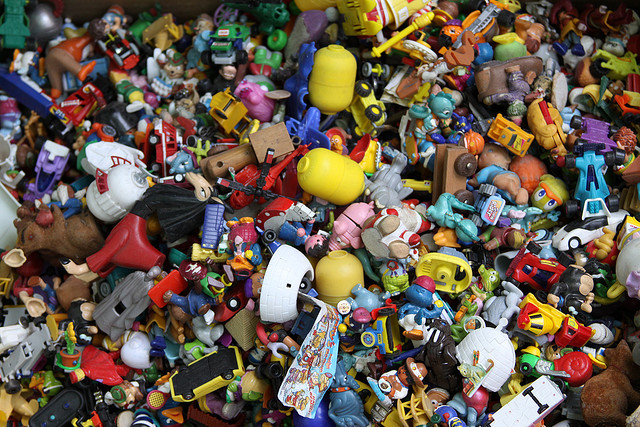I’ve noticed on a couple different web sites recently that moms are beginning to fret about Christmas presents for their kids. One worried mom posted, “Any ideas for Christmas presents for my two year old? I’m really struggling.” Really? Two is the age where a child thinks that pooping in the tub, shredding napkins, and throwing socks and shoes into the trash can is fun. Kids this age also lack the vocabulary to say, “Really? A slinky? That is so not what was on my list.” So why the struggle?
We must recognize we are raising our children in  a culture that desperately wants them to think that their happiness and joy comes from what they own, what they do, and how they look. It doesn’t. According to a national poll, 1954 was the last time that most Americans rated themselves as being “very happy,” yet housing sizes have doubled since then. The walk-in closets, three car garages, and whirlpool tubs have actually decreased our level of happiness. As parents we must accept this truth: no toy, no experience, no iAnything is going to make our kids happy for the long run.
a culture that desperately wants them to think that their happiness and joy comes from what they own, what they do, and how they look. It doesn’t. According to a national poll, 1954 was the last time that most Americans rated themselves as being “very happy,” yet housing sizes have doubled since then. The walk-in closets, three car garages, and whirlpool tubs have actually decreased our level of happiness. As parents we must accept this truth: no toy, no experience, no iAnything is going to make our kids happy for the long run.
Happiness is an inside job. The apostle Paul writes about having to learn to be content even when he was well fed or in times of plenty. So even if we are in plenty we can be discontent? Just look into the tear-stained face of a toddler at their own birthday party. If we buy into the lie of our culture and look to the stuff to make our kids happy this Christmas, we will send them the false message that seeking more and more stuff will fill them up. Rather, it will only leave them feeling empty a few days later.
So am I against Christmas presents? Certainly not. But I am against the hype, the extensive wish lists, the extravagance, the Toys R Us catalogue porn, and the stuff obsession some kids can have this time of year. Use all their whining to point out that advertisers have convinced them that they NEED the toy company’s stuff and this quest for stuff is robbing them of the joy of this season—the season to celebrate the birth of our Savior.
When one of my boys was about 4 years-old and struggling with looking to his toys to make him happy, I asked him,” What makes us truly happy, buddy? People or things?” He looked me straight in the eye and admitted, “Actually Mom, people who buy me things make me really happy!” We had some work to do, and Christmas is always a great time to teach.
Contentment is not a discussion—it is a lifestyle.
Take this Christmas season to develop traditions and rituals that minimize the significance of presents while maximizing the innate joy of the season.
1) Kids don’t need any more toys. None. I bet that every single kid whose parent is reading this has enough toys. I bet they don’t play with most of the toys they have. I bet they can’t name three gifts from last Christmas. Don’t be swayed into a truckload of new toys that won’t be played with come February.
2) Purge. Examine every shelf, closet, tub, and toy box for unloved toys. Decide which ones should be given away and which few might be saved in storage to pass down. If it’s not played with—get rid of it or PLAY with it. Make a stack of games that have not been played in a year and commit to playing one each week until Christmas.
3) Talk about the excess of toys and games. Do more toys make us happier? Relationships with people and God make us happy. Too much stuff can be distracting and actually make us sad, sullen, and ungrateful.
4) The best toy ever made is—nature. Send kids outside. Take them on walks. Look at animals and insects and stars. Roll in the grass or snow and whack a bush with a stick or throw rocks in a creek (usually mothers of boys can’t avoid this). Consider toys that can be played with outside like bikes, scooters, and bubbles.
5) A few presents and a fun stocking of goodies makes a child just as happy as $300 in electronics and $300 in new clothes. Set a low budget and bless your kids by not buying them too much stuff. Less really is more. If your kids are young, this is easy. But if you have had toys-gone-wild Christmases in the past, you may hear ungrateful words. Prepare them ahead of time. It might take a targeted reduction in stuff in order for gratitude to return to your home.
6) Find giving opportunities. Most churches and even schools have giving trees and adopt-a-family opportunities. Give time by visiting or serving people as well.
7) Buy items for your kids that you would need to buy them throughout the year anyway. Christmas doesn’t have to be a budget buster. Anything wrapped is a gift and is exciting to open.
8) Stop comparing or feeling guilty. Create your own family traditions. One of my friends with young kids understands it’s too crazy to bake a bunch of cookies during the Christmas season, so they bake them on New Year’s Day when the added stress has left the home.
9) Don’t fall victim to the “Hot Christmas Toy Syndrome.” You know your kids. Buy them what you know they would enjoy—not what they think they would enjoy just because it is popular. People camped out, fought, and paid hundreds of dollars for a Tickle Me Elmo. Who’s laughing now?
10) Teach your kids about “enough” so they will appreciate abundance when they see it. True, every day isn’t Christmas, but can we celebrate Christmas in a way that honors God and doesn’t focus our children on seeking material possessions for happiness. Consider the joy on the faces of kids living in impoverished countries and ask, “Which country is truly impoverished?”
Give Your Kids the Gift of Enough



I learned all of this the hard way when our first child was 3. We went crazy that year. We loved and we loved our only child. We probably spent $500 on her that year. She opened presents for about 30 minutes straight. Then, it was time for us to open our presents to each other. Her response? “Where’s mine?” The many weren’t enough.
Now we do three presents or themes in a box with a budget of $100 per kid. I figure if three presents were enough for the King of Kings, then it’s enough for our little princesses and prince.
Typo: We loved *Christmas* and we loved our only child.
I wanted you to know that I included your quote in my new book. I didn’t use your name–BUT you’ll always know it was you! Thanks! You are not alone
Thanks! You are not alone